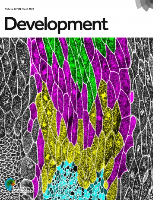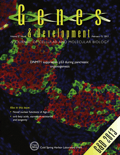
DEVELOPMENT GROWTH & DIFFERENTIATION
metrics 2024
Driving Insights into Developmental Processes
Introduction
DEVELOPMENT GROWTH & DIFFERENTIATION, published by Wiley, stands as a vital journal in the realms of Cell Biology, Developmental Biology, and Medicine. With an ISSN of 0012-1592 and E-ISSN of 1440-169X, this esteemed journal has been a key player in the scientific community since its inception in 1969, continuing to contribute significantly to the understanding of developmental processes and mechanisms underlying growth and differentiation. Ranked Q3 in Cell Biology and Developmental Biology, and Q2 in miscellaneous aspects of Medicine as of 2023, the journal provides a platform for high-quality research articles, reviews, and critical insights that foster academic discourse in these vital fields. Although currently not available as open access, the journal ensures the availability of essential research to its global readership, facilitating collaboration and innovation. Researchers, professionals, and students alike will find DEVELOPMENT GROWTH & DIFFERENTIATION to be an invaluable resource for advancing knowledge and driving forward the scientific inquiry into the intricacies of biological development.
Metrics 2024
 0.76
0.76 1.70
1.70 2.10
2.10 73
73Metrics History
Rank 2024
Scopus
IF (Web Of Science)
JCI (Web Of Science)
Quartile History
Similar Journals

FOLIA BIOLOGICA
Advancing Biological Insights Since 1961FOLIA BIOLOGICA, published by Charles University Prague, First Faculty of Medicine, is an esteemed academic journal that has been contributing to the fields of Biochemistry, Cell Biology, Developmental Biology, Genetics, Immunology, and Molecular Biology since its inception in 1961. With an ISSN of 0015-5500, this journal serves as a vital platform for researchers and professionals to disseminate their findings and advance knowledge within these disciplines. Despite its current Category Quartiles ranking in the lower tiers (Q3 and Q4), FOLIA BIOLOGICA continues to provide valued insights and foster scholarly dialogue, particularly in its paralleled fields. The journal is headquartered in Prague, Czech Republic, and operates without Open Access options, which emphasizes its focus on curated, peer-reviewed content essential for academicians and students. By bridging theoretical and practical knowledge, FOLIA BIOLOGICA remains committed to enriching the scientific community and serving as a cornerstone for future research innovations.

DEVELOPMENTAL BIOLOGY
Advancing the Frontiers of Developmental ResearchDEVELOPMENTAL BIOLOGY, published by Academic Press Inc., Elsevier Science, stands as a pivotal journal in the fields of cell biology, developmental biology, and molecular biology since its inception in 1959. Renowned for its rigorous peer-review process, this journal serves as a platform for publishing cutting-edge research, reviews, and insights that drive forward our understanding of developmental processes at the cellular and molecular levels. With an impressive track record, it is classified in the Q2 quartile across multiple categories, reflecting its significant impact and relevance in academia and research communities. Although the journal does not provide Open Access options, it remains accessible via numerous academic databases, ensuring a wide reach for researchers, professionals, and students alike. With a commitment to advancing the field, DEVELOPMENTAL BIOLOGY continues to be essential reading for those looking to stay at the forefront of developmental research and its applications.

CELL RESEARCH
Illuminating the Pathways of Life SciencesCELL RESEARCH is a premier peer-reviewed journal dedicated to advancing the field of cell biology and molecular biology, published by SpringerNature. With an impressive impact factor and consistently ranking in the Q1 quartile for both cell biology and molecular biology, this journal serves as a pivotal resource for researchers, professionals, and students seeking to explore the latest discoveries and advancements in cellular mechanisms and their implications for health and disease. Since its inception in 1996, CELL RESEARCH has cultivated a distinguished reputation, currently boasting ranks in the top percentile of Scopus categories, reaffirming its influence and relevance to the scientific community. Although it is not an Open Access journal, its rigorous selection process ensures the publication of high-quality articles that contribute significantly to our understanding of life sciences. For those deeply engaged in the realms of biochemistry, genetics, and molecular biology, CELL RESEARCH is an essential conduit of innovative research and critical insights.

EMBO REPORTS
Advancing Molecular Biology Through Rigorous ResearchEMBO REPORTS, published by WILEY, is a premier journal in the fields of Biochemistry, Genetics, and Molecular Biology, recognized for its rigorous peer-review process and impactful scientific contributions. Established in the year 2000 in the United Kingdom, this journal has maintained a stellar reputation, reflected in its consistent positioning within the Q1 category across these disciplines as of 2023. EMBO REPORTS excels in disseminating high-quality and timely research that addresses fundamental questions and challenges in molecular biology and genetics, making it an invaluable resource for researchers, professionals, and students. With impressive Scopus rankings, including Genetics at the 32nd rank and a 90th percentile placement, it fosters an environment for scholarly exchange and advances in knowledge. While Open Access options are not available, the journal continues to enhance its impact through traditional subscription models, thereby maintaining wide visibility in the scientific community. Its ongoing evolution promises continued relevance and influence until at least 2024.

SEMINARS IN CELL & DEVELOPMENTAL BIOLOGY
Leading Insights into Developmental ProcessesSEMINARS IN CELL & DEVELOPMENTAL BIOLOGY is a premier journal published by Academic Press Ltd - Elsevier Science Ltd, focusing on the vital domains of cell and developmental biology. With an impact factor that reflects its rigorous contributions to the field, this journal embodies the highest standards of academic excellence, currently ranking in the Q1 quartile for both Cell Biology and Developmental Biology categories as of 2023. Researchers and practitioners will appreciate its robust Scopus ranking, placing it within the top tiers of developmental biology and cell biology, with percentile ranks of 94th and 90th respectively, showcasing the journal's influential presence in the scientific community. The journal aims to disseminate comprehensive reviews, cutting-edge research articles, and significant advances in the understanding of cellular mechanisms and developmental processes, thereby catering to a diverse audience that includes researchers, scholars, and students dedicated to the life sciences. Given its commitment to open access, SEMINARS IN CELL & DEVELOPMENTAL BIOLOGY promotes widespread dissemination of knowledge, enhancing collaborative research efforts and driving innovation across biological disciplines.

DEVELOPMENT
Exploring the molecular foundations of life’s intricate designs.DEVELOPMENT is a preeminent journal published by COMPANY BIOLOGISTS LTD, headquartered in the United Kingdom. With an ISSN of 0950-1991 and an E-ISSN of 1477-9129, this esteemed journal has been at the forefront of the fields of Developmental Biology and Molecular Biology since its inception in 1987. Recognized for its rigorous peer review process and high-caliber research, DEVELOPMENT holds an impressive Q1 ranking in both disciplines as of 2023, underscoring its pivotal role in advancing scientific understanding. The journal is particularly noted for its contributions to the understanding of developmental processes, their molecular underpinnings, and their implications in health and disease. With a significant impact factor, DEVELOPMENT aims to disseminate groundbreaking research that inspires novel insights and future explorations within the biological sciences, making it an essential resource for researchers, professionals, and students alike. The journal also maintains accessibility for its readership, ensuring that significant research findings reach those who can apply and build upon them.

Journal of Developmental Biology
Exploring the Dynamics of Life's Building BlocksJournal of Developmental Biology, published by MDPI, is an esteemed open access journal that has been contributing to the field since its inception in 2013. With a focus on developmental processes across various biological systems, this journal serves as a vital platform for disseminating cutting-edge research and fostering dialogue among experts in the fields of Cell Biology, Developmental Biology, and Molecular Biology. The journal currently holds a commendable Q2 ranking in both Developmental Biology and Molecular Biology, underscoring its significance in advancing knowledge within these domains. Operating out of Switzerland, and featuring an engaging array of articles, the journal prioritizes accessibility through its Open Access model, further expanding the reach of vital research findings. Whether you are a seasoned researcher or an enthusiastic student, the Journal of Developmental Biology provides an essential resource for the latest insights and developments in this rapidly evolving field.

FLY
Uncovering the Secrets of the Insect WorldFLY, an esteemed journal published by Taylor & Francis Inc, is a leading resource in the field of Insect Science, offering cutting-edge research and insights into the biology, ecology, and management of flies and related insect species. With an impressive Impact Factor reflecting its high citation and publication standards, FLY serves as a vital platform for researchers and practitioners aiming to advance their understanding of this diverse and crucial group of organisms. The journal, which has been publishing since 2007 and is set to continue until 2024, is recognized as a Q1 category journal in its discipline, ranked 58 out of 181 in Agricultural and Biological Sciences, placing it in the 68th percentile of the field. Although currently non-open access, the journal is committed to disseminating valuable knowledge and fostering collaboration among scientists, offering unparalleled opportunities for professionals, researchers, and students to engage with transformative science in the insect realm.

Annual Review of Cell and Developmental Biology
Pioneering Discoveries in Cellular and Developmental ScienceThe Annual Review of Cell and Developmental Biology, published by Annual Reviews, stands as a premier journal in the fields of cell biology and developmental biology. Established in 1995, this influential journal has continuously provided comprehensive and critical reviews that synthesize the latest findings in these vibrant research areas, catering to the interests of researchers, professionals, and students alike. With an impressive impact factor, the journal ranks in the top quartile (Q1) for both Cell Biology and Developmental Biology, boasting remarkable Scopus rankings—#1 in Developmental Biology and #22 in Cell Biology. This emphasizes its significance and authority within the academic community. Although the journal does not operate under an open-access model, it remains a crucial resource for those seeking to stay at the forefront of scientific discoveries and theoretical advancements. The Annual Review of Cell and Developmental Biology continues to solidify its status as an essential platform for sharing knowledge and stimulating scientific inquiry.

GENES & DEVELOPMENT
Pioneering Insights into Developmental Processes and GeneticsGENES & DEVELOPMENT, published by COLD SPRING HARBOR LAB PRESS, stands as a premier journal in the fields of Developmental Biology and Genetics, boasting a remarkable impact factor that reflects its prestigious position in the academic community—ranking Q1 in both disciplines as of 2023. Since its inception in 1987, this journal has been at the forefront of disseminating cutting-edge research, effectively bridging the gap between laboratory breakthroughs and their applications in health and disease. Researchers and professionals rely on GENES & DEVELOPMENT for its rigorous peer-review process and its commitment to promoting innovative studies that unravel the complexities of gene functions and developmental processes. With Scopus rankings placing it in the top percentile among its peers, this journal serves as a vital resource for students and established scientists alike, aspiring to expand their knowledge and contribute to the ever-evolving landscape of genetic and developmental research.